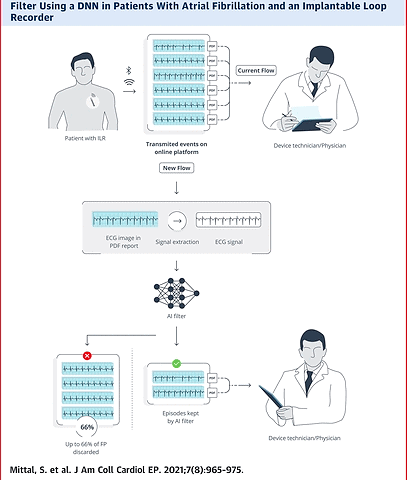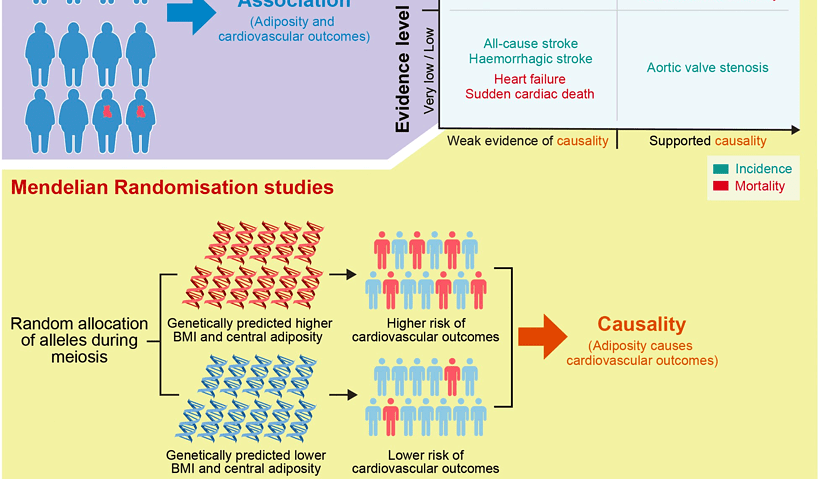By Thomas F LüscherTaken directly from the European Heart Journal. Well, wine is truly a joy, but at best neutral when consumed in moderation. Chocolate…
View More Are wine, chocolate, coffee: forbidden joys?Tag: Atrial Fibrillation
Clinical Validation and Evaluation of the novel six lead handheld ECG recorder compared to the 12 lead ECG in unselected cardiology patients (EVALECG Cardio)
By M Azram et al Taken directly from European Heart Journal – Digital Health There is a lack of studies validating the use of handheld devices…
View More Clinical Validation and Evaluation of the novel six lead handheld ECG recorder compared to the 12 lead ECG in unselected cardiology patients (EVALECG Cardio)AI Filter Improves Positive Predictive Value of Atrial Fibrillation Detection by an Implantable Loop Recorder
By Suneet Mittal et al The purpose of this study was to determine whether incorporation of a 2-part artificial intelligence (AI) filter can improve the…
View More AI Filter Improves Positive Predictive Value of Atrial Fibrillation Detection by an Implantable Loop RecorderImpact of adiposity on cardiovascular outcomes: an umbrella review and meta-analysis provides updated insights
The aim of this study was to investigate the causal relationship and evidence of an association between increased adiposity and the risk of incident cardiovascular disease (CVD) events or mortality.
View More Impact of adiposity on cardiovascular outcomes: an umbrella review and meta-analysis provides updated insightsNICE- Atrial Fibrillation Guidelines
Expert Opinion by: Dr Steve Furniss, Consultant Cardiologist, East Sussex Healthcare Trust
View More NICE- Atrial Fibrillation GuidelinesImpact of wearable devices on clinical outcomes and health care utilisation in AF patients
Summary taken directly from the American College of Cardiology Quick Takes Patients with AF who use wearable devices for detection of AF are more than…
View More Impact of wearable devices on clinical outcomes and health care utilisation in AF patientsHOLIDAY Monitors: Alcohol Consumption Significantly Increases Risk of AFib Episode
Taken directly from the American College of Cardiology One glass of wine, beer or other alcoholic beverage may significantly increase the risk of an atrial…
View More HOLIDAY Monitors: Alcohol Consumption Significantly Increases Risk of AFib EpisodeNICE publishes updated clinical guideline on the diagnosis and management of atrial fibrillation
Key changes: Bleeding risk scoreNew NICE guideline recommends using the ORBIT bleeding risk score but equally recognises that existing bleeding risk scores may still be…
View More NICE publishes updated clinical guideline on the diagnosis and management of atrial fibrillationInflammatory biomarkers linked with heart failure hospitalisation in atrial fibrillation
By Ahmed El-Medany Among atrial fibrillation (AF) patients, inflammatory markers strongly predict heart failure (HF) hospitilisation. Benz et al analysed 3,784 individuals with AF (median…
View More Inflammatory biomarkers linked with heart failure hospitalisation in atrial fibrillationAtrial fibrillation increases beat-to-beat variability of cerebral microcirculatory perfusion – a potential target for reducing long-term cognitive decline?
By Ahmed El-Medany This pioneering in vivo study by Saglietto et al investigated beat-to-beat microcirculatory perfusion during atrial fibrillation (AF) by using near-infrared spectroscopy to…
View More Atrial fibrillation increases beat-to-beat variability of cerebral microcirculatory perfusion – a potential target for reducing long-term cognitive decline?








